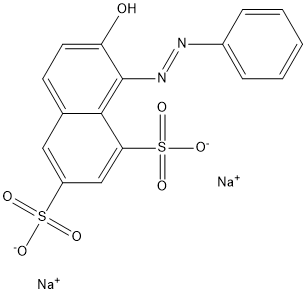
Dinatrium-7-hydroxy-8-phenylazonaphthalin-1,3-disulfonat
Bezeichnung:Dinatrium-7-hydroxy-8-phenylazonaphthalin-1,3-disulfonat
CAS-Nr1936-15-8
Englisch Name:Acid Orange 10
CBNumberCB5777321
SummenformelC16H10N2Na2O7S2
Molgewicht452.36
MOL-Datei1936-15-8.mol
Synonyma
Dinatrium-7-hydroxy-8-phenylazonaphthalin-1,3-disulfonat
Dinatrium-7-hydroxy-8-phenylazonaphthalin-1,3-disulfonat physikalisch-chemischer Eigenschaften
| Schmelzpunkt | 141 °C |
| Dichte | 0.80 g/mL at 20 °C |
| chüttdichte | 430kg/m3 |
| Flammpunkt | 14 °C |
| storage temp. | room temp |
| Löslichkeit | H2O: soluble1mg/mL |
| Colour Index | 16230 |
| Aggregatzustand | Powder |
| pka | 12.8(at 25℃) |
| Farbe | Red to Orange |
| PH | 9 (10g/l, H2O, 20℃) |
| Säure-Base-Indikators(pH-Indikatoren) | Yellow (11.5) to pink (14.0) |
| Wasserlöslichkeit | 5 g/100 mL (20 ºC) |
| maximale Wellenlänge (λmax) | 475 nm |
| ε(Extinktionskoeffizient) | ≥10000 at 329-331nm in H2O ≥17000 at 473-479nm in H2O ≥20500 at 246-250nm in H2O |
| BRN | 4120705 |
| Stabilität | Stable. Incompatible with strong oxidizing agents. |
| Biologische Anwendungen | Detecting lung cancer metastasis; measuring glycated proteins; ophthalmic devices |
| Kennzeichnung gefährlicher | Xi,F |
| R-Sätze: | 36/37/38-11 |
| S-Sätze: | 22-24/25-37/39-26-16-7-36/37 |
| RIDADR | UN 1987 3/PG 2 |
| WGK Germany | 3 |
| RTECS-Nr. | QJ6500000 |
| TSCA | Yes |
| HS Code | 32041200 |
| Giftige Stoffe Daten | 1936-15-8(Hazardous Substances Data) |
| Toxizität | LD50 orally in Rabbit: > 3000 mg/kg |

